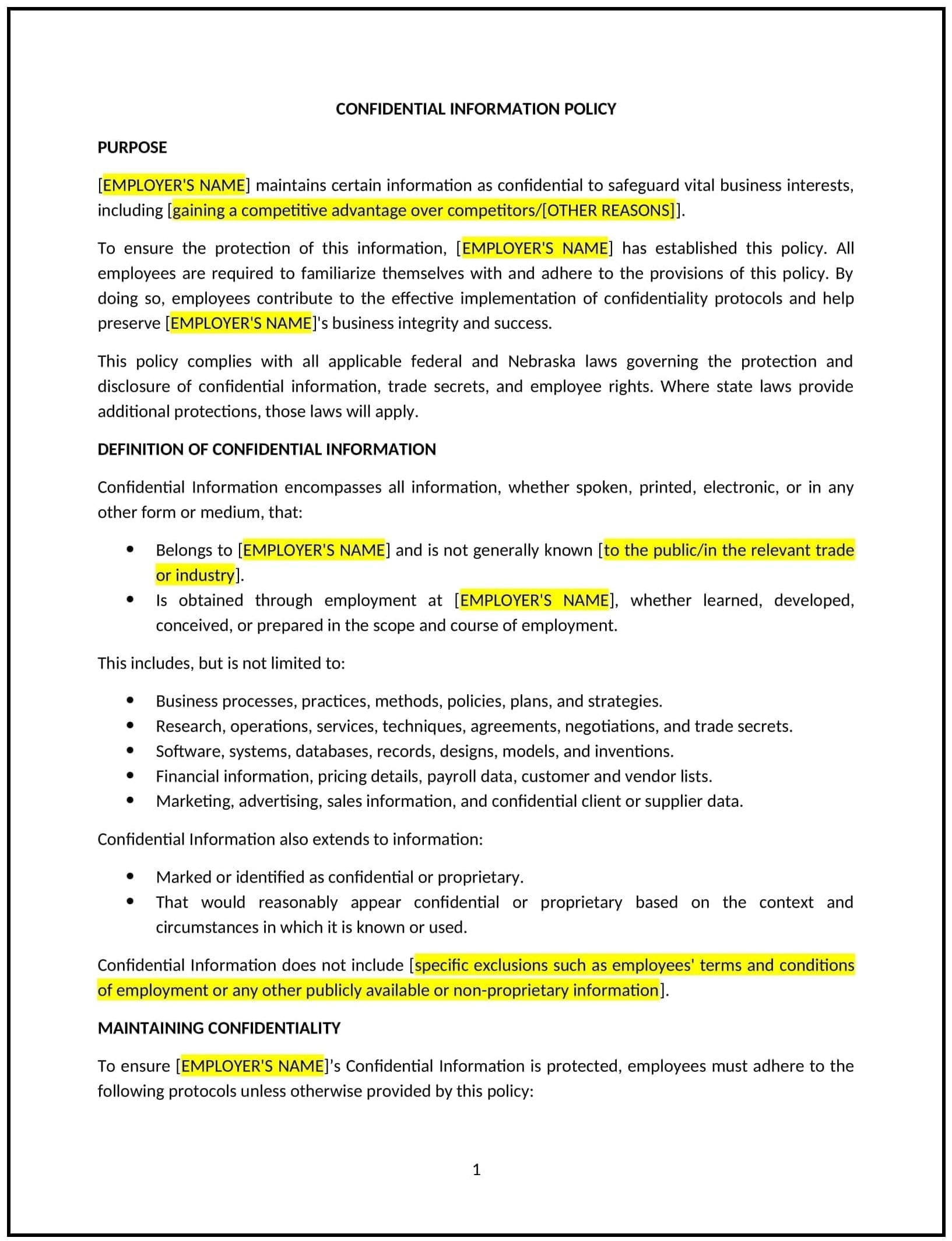Confidential information policy (Nebraska): Free template
Got contracts to review? While you're here for policies, let Cobrief make contract review effortless—start your free review now.

Customize this template for free
Confidential information policy (Nebraska)
A confidential information policy helps Nebraska businesses protect sensitive and proprietary information from unauthorized access, use, or disclosure. This policy outlines what constitutes confidential information, the responsibilities of employees and contractors to protect that information, and the procedures for handling confidential data. It is designed to safeguard intellectual property, client information, and other critical data, ensuring that the business maintains a competitive advantage and adheres to privacy standards.
By adopting this policy, businesses in Nebraska can minimize the risk of data breaches, protect their assets, and maintain trust with clients, employees, and stakeholders.
How to use this confidential information policy (Nebraska)
- Define confidential information: Clearly specify what constitutes confidential information, including intellectual property, business plans, financial data, client information, employee records, and any other data that must be protected from unauthorized disclosure.
- Set handling procedures: Outline how confidential information should be handled, stored, and transmitted to ensure its security. Specify the tools and systems that should be used to protect this data (e.g., encrypted storage, secure communication methods).
- Establish access controls: Define who is authorized to access confidential information and under what circumstances. Set guidelines for ensuring that only those who need the information to perform their job duties are granted access.
- Set non-disclosure expectations: Require employees, contractors, and partners to sign non-disclosure agreements (NDAs) to legally bind them to the confidentiality requirements. Outline the legal ramifications of disclosing confidential information without authorization.
- Provide training: Offer training on the importance of protecting confidential information, how to recognize sensitive data, and the proper protocols for handling it.
- Address reporting violations: Specify the steps employees should take if they suspect or discover a breach of confidentiality, and the actions the company will take to investigate and resolve such issues.
- Define consequences for violations: Outline the disciplinary measures for failing to adhere to the confidentiality policy, including possible termination, legal action, and financial penalties.
- Review and update: Periodically review and update the policy to reflect changes in Nebraska laws, data security practices, and business operations.
Benefits of using this confidential information policy (Nebraska)
This policy provides several benefits for Nebraska businesses:
- Protects business assets: Safeguarding confidential information protects the company's intellectual property, trade secrets, and sensitive client data from being exploited or misused.
- Reduces the risk of legal issues: By ensuring confidentiality is maintained, businesses reduce the likelihood of legal consequences related to data breaches or unauthorized disclosures.
- Builds trust: Clients, employees, and partners are more likely to trust a business that takes steps to protect sensitive information, improving relationships and fostering long-term business success.
- Improves compliance: A solid policy helps businesses adhere to relevant data privacy regulations, including state-specific and federal laws, such as HIPAA or GDPR, where applicable.
- Enhances employee awareness: Educating employees about confidentiality helps reduce accidental breaches and ensures that everyone understands their responsibility in protecting sensitive information.
Tips for using this confidential information policy (Nebraska)
- Communicate the policy clearly: Ensure all employees, contractors, and business partners understand the definition of confidential information and the procedures for handling it. Make sure they are aware of the policy during onboarding and throughout their employment.
- Implement strong access controls: Limit access to confidential information to only those employees or contractors who need it for their job functions. Use tools like role-based access control to manage who can view or modify sensitive data.
- Regularly review security practices: Periodically assess how confidential information is being protected, and update the policy or systems as necessary to address emerging security risks or legal requirements.
- Foster a culture of confidentiality: Encourage employees to report any potential breaches and to actively protect sensitive information in their daily work practices.
- Stay current with legal changes: Review the policy regularly to ensure it aligns with Nebraska laws and any applicable industry regulations regarding data protection and privacy.